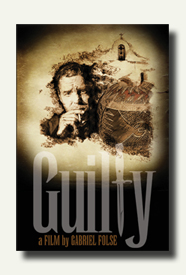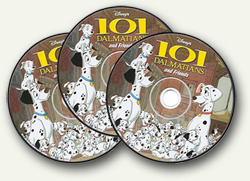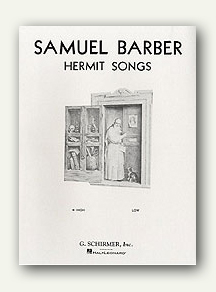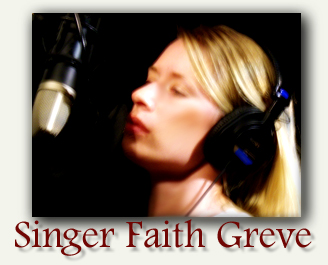 by Gary Powell
by Gary Powell
As a creative strategy in scoring Glendalough Studios’ movie Guilty, I first composed the song “Obscura la Noche”. Although the movie is in English Gabe Folse, the director of the film, and I agreed that the lyric played more emotionally when sung in Spanish. In the truest sense, this song is a “theme song” in that the melodic content and harmonization reflect the Latino culture and the layered internal compromises of the characters. Many of the film’s musical cues quote themes taken from both the harmonization and the melodies from the song itself. These musical components of the song are indeed inner-woven into the score which purposefully presents itself as one piece of music. The end effect of this compositional technique is that as the song is finally revealed at the end of the movie, audiences will already be familiar with it like an old friend you haven’t seen in years.
Hank Olguin, who masterfully translated my English lyric into Spanish, introduced me to singer Sara Traina of Indart Music. Sara is a native Spanish speaker and as Hank suggested, was the perfect singer to deliver the emotional impact of this song using her haunting and soulful voice. Sara is a principle player with Indart Music and Sound Productions in Los Angeles and Hank Olguin also works within this impressive music group from his home base in Mountain View, California. I offer many thanks to both Hank and Sara for working on a very short deadline and for delivering such a beautiful performance and also to audio engineer, Danny Osuna, who recorded Sara’s vocal.
(SITE TIP: Click on the script “Listen” to hear the music described in each post throughout this site.)
Composer & Lyricist: Gary Powell
Translator from English to Spanish: Hank Olguin
Vocalist: Sara Traina
Vocal Recorded by: Danny Osuna
Recorded and Mixed by: Gary Powell
Piano & Percussion: Gary Powell
Guitar: Larry Seyer
Upright Bass: Larry Seyer’s Acoustic Bass Library featuring the samples of Spencer Starnes, bassist

“Obscura la Noche”
Music and Lyrics by Gary Powell
(Spanish Translation by Hank Olguin)
Copyright 2007 Jesmax Music, BMI
Dark the Night
(Obscura la Noche)
Words and Music by Gary Powell
When the day is gone
And the night is long
There’s no way to live
Nothing’s left to give
Wash the day away
Hold the pain at bay
Settled for a knife
Settled for my life
Dark the night (Obscura la noche)
Dark the day (Obscuro el dia)
On the lonely path of only hurting
Loving souls when I once loved in light
Just below the skin
Looking deep within
There’s a place to rest
Where I’ll pass the test
Fluid threads are creased
Fragments cloak the peace
A dark soul to bear
Masked from all who care
Dark the night (Obscura la noche)
Dark the day (Obscuro el dia)
On the lonely path of only hurting
Loving souls when I once loved in light
When the day is gone
And the night is long
There’s no way to live
Nothing’s left to give
Dark the night (Obscura la noche)
Dark the day (Obscuro el dia)
On the lonely path of only hurting
Loving souls when I once loved in light
(Copyright 2007 Jesmax Music, BMI)
All Content of Gary Powell’s Site is Licensed Under a
Creative Commons Attribution-NonCommercial-NoDerivs 2.5 License

.
 by Gary Powell
by Gary Powell
As a creative strategy in scoring Glendalough Studios’ movie Guilty, I first composed the song “Obscura la Noche”. Although the movie is in English Gabe Folse, the director of the film, and I agreed that the lyric played more emotionally when sung in Spanish. In the truest sense, this song is a “theme song” in that the melodic content and harmonization reflect the Latino culture and the layered internal compromises of the characters. Many of the film’s musical cues quote themes taken from both the harmonization and the melodies from the song itself. These musical components of the song are indeed inner-woven into the score which purposefully presents itself as one piece of music. The end effect of this compositional technique is that as the song is finally revealed at the end of the movie, audiences will already be familiar with it like an old friend you haven’t seen in years.
Hank Olguin, who masterfully translated my English lyric into Spanish, introduced me to singer Sara Traina of Indart Music. Sara is a native Spanish speaker and as Hank suggested, was the perfect singer to deliver the emotional impact of this song using her haunting and soulful voice. Sara is a principle player with Indart Music and Sound Productions in Los Angeles and Hank Olguin also works within this impressive music group from his home base in Mountain View, California. I offer many thanks to both Hank and Sara for working on a very short deadline and for delivering such a beautiful performance and also to audio engineer, Danny Osuna, who recorded Sara’s vocal.
(SITE TIP: Click on the script “Listen” to hear the music described in each post throughout this site.)
Composer & Lyricist: Gary Powell
Translator from English to Spanish: Hank Olguin
Vocalist: Sara Traina
Vocal Recorded by: Danny Osuna
Recorded and Mixed by: Gary Powell
Piano & Percussion: Gary Powell
Guitar: Larry Seyer
Upright Bass: Larry Seyer’s Acoustic Bass Library featuring the samples of Spencer Starnes, bassist

“Obscura la Noche”
Music and Lyrics by Gary Powell
(Spanish Translation by Hank Olguin)
Copyright 2007 Jesmax Music, BMI
Dark the Night
(Obscura la Noche)
Words and Music by Gary Powell
When the day is gone
And the night is long
There’s no way to live
Nothing’s left to give
Wash the day away
Hold the pain at bay
Settled for a knife
Settled for my life
Dark the night (Obscura la noche)
Dark the day (Obscuro el dia)
On the lonely path of only hurting
Loving souls when I once loved in light
Just below the skin
Looking deep within
There’s a place to rest
Where I’ll pass the test
Fluid threads are creased
Fragments cloak the peace
A dark soul to bear
Masked from all who care
Dark the night (Obscura la noche)
Dark the day (Obscuro el dia)
On the lonely path of only hurting
Loving souls when I once loved in light
When the day is gone
And the night is long
There’s no way to live
Nothing’s left to give
Dark the night (Obscura la noche)
Dark the day (Obscuro el dia)
On the lonely path of only hurting
Loving souls when I once loved in light
(Copyright 2007 Jesmax Music, BMI)
All Content of Gary Powell’s Site is Licensed Under a
Creative Commons Attribution-NonCommercial-NoDerivs 2.5 License

.



 Loneliness is the absence of the other, but solitude is the company of the self. –
Loneliness is the absence of the other, but solitude is the company of the self. –  by Gary Powell
by Gary Powell

 I have previously written about the
I have previously written about the